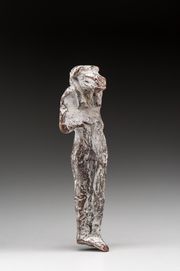Difference between revisions of "Wax"
| Line 8: | Line 8: | ||
- vegetable: [[carnauba%20wax|carnauba]], [[candelilla%20wax|candelilla]], [[bayberry%20wax|bayberry]], [[Japan%20wax|Japan wax]] | - vegetable: [[carnauba%20wax|carnauba]], [[candelilla%20wax|candelilla]], [[bayberry%20wax|bayberry]], [[Japan%20wax|Japan wax]] | ||
| − | - mineral: [[paraffin%20wax|paraffin]], [[ozocerite]], [[ceresin%20wax|ceresin]], [[montan%20wax|montan]] | + | - mineral: [[paraffin%20wax|paraffin]], [[ozocerite]], [[ceresin%20wax|ceresin]], [[montan%20wax|montan]], [[microcrystalline]] |
- synthetic: [[polyethylene]], polymethylene, [[Carbowax|Carbowax®]], [[Halowax%C2%AE|Halowax®]] | - synthetic: [[polyethylene]], polymethylene, [[Carbowax|Carbowax®]], [[Halowax%C2%AE|Halowax®]] | ||
Revision as of 11:46, 21 August 2020
Description
A solid or semi-solid substance that is slightly greasy to touch. Waxes are composed of long chain hydrocarbon compounds, and may contain esters of fatty acids and alcohols. They are thermoplastic and melt at low temperatures (between 40 and 100C). In general, waxes are water-repellent, smooth, and soluble in organic solvents. Waxes are classified by their origin:
- animal: Beeswax, Lanolin, Spermaceti, Lac wax
- vegetable: carnauba, candelilla, bayberry, Japan wax
- mineral: paraffin, Ozocerite, ceresin, montan, Microcrystalline
- synthetic: Polyethylene, polymethylene, Carbowax®, Halowax®
Waxes are used for polishes, candles, crayons, sealants, coatings, adhesives, waterproofing, and carbon paper. Waxes have been used as a media in encaustic and Wax emulsion paintings, and as repellents in wax-resist watercolor paintings.
Synonyms and Related Terms
voks (Dan.); Wachs (Deut.); cera (Esp., It.); cire (Fr.); wosk (Pol.); vax (Sven.)
Types include: animal wax; synthetic wax, mineral wax; vegetable wax
Physical and Chemical Properties
Soluble in most organic solvents. Insoluble in water.
Comparisons
Resources and Citations
- C.Harley, "Wax" The Dictionary of Art, Grove's Dictionaries Inc., New York, 1996.
- G.S.Brady, Materials Handbook, McGraw-Hill Book Co., New York, 1971 Comment: p. 862
- Ralph Mayer, A Dictionary of Art Terms and Techniques, Harper and Row Publishers, New York, 1969 (also 1945 printing)
- Encyclopedia Britannica, http://www.britannica.com Comment: "wax" [Accessed 20 Sept. 2005].
- The Dictionary of Art, Grove's Dictionaries Inc., New York, 1996 Comment: "Wax" by C. Harley
- Wikipedia: http://en.wikipedia.org/wiki/Wax (Accessed Sept. 20, 2005)
- Richard S. Lewis, Hawley's Condensed Chemical Dictionary, Van Nostrand Reinhold, New York, 10th ed., 1993
- Tom Rowland, Noel Riley, A-Z Guide to Cleaning, Conserving and Repairing Antiques, Constable and Co., Ltd., London, 1981
- Matt Roberts, Don Etherington, Bookbinding and the Conservation of Books: a Dictionary of Descriptive Terminology, U.S. Government Printing Office, Washington DC, 1982
- Van Nostrand's Scientific Encyclopedia, Douglas M. Considine (ed.), Van Nostrand Reinhold, New York, 1976
- Random House, Webster's Encyclopedic Unabridged Dictionary of the English Language, Grammercy Book, New York, 1997
- Random House, Webster's Encyclopedic Unabridged Dictionary of the English Language, Grammercy Book, New York, 1997
- The Merck Index, Martha Windholz (ed.), Merck Research Labs, Rahway NJ, 10th edition, 1983
- The American Heritage Dictionary or Encarta, via Microsoft Bookshelf 98, Microsoft Corp., 1998
- Website: www.hants.org.uk/museums/ofr/cmeth_t.html


